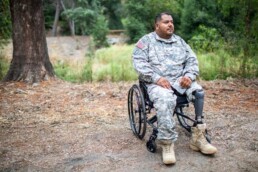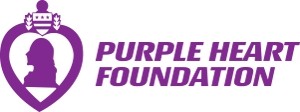
Resources for Veterans
Veterans may face a multitude of physical and mental challenges. Veterans’ families are often unprepared to deal with a family member who may experience pain, nightmares, feelings of detachment, irritability, trouble concentrating, and sleeplessness. These are some of the symptoms of Post Traumatic Stress Disorder (PTSD).
Experts estimate that between 25% and 30% of Vietnam veterans who fought in combat have symptoms of PTSD and the experiences associated with combat. It’s been recently estimated that 30% of combat soldiers returning from service in Iraq and Afghanistan are experiencing similar trauma.
If you carry the physical and emotional scars of battle and need support, we have a few resources for you to access to help you begin to heal.
- PTSD Self Assessment – The PTSD Checklist for DSM-5, frequently referred to as the PCL-5, is a self-assessment to measure the presence and severity of PTSD symptoms. DSM-5 refers to the American Psychiatric Association’s Diagnostic and Statistical Manual of Mental Disorders, which is the standard reference used by healthcare providers to diagnose mental health and behavioral conditions.
- National Center For PTSD
- About Face: Get the facts about posttraumatic stress disorder (PTSD), learn about treatment options, and explore personal stories from Veterans, family members, and VA clinicians.
- Mayo Clinic PTSD Overview
- Understanding PTSD
- Understanding PTSD Treatment: Read about the therapies and medications that are proven to help people with PTS. Hear from experts about what treatment is like and how it can help you.
- Share Program at Shepherd Center Care for U.S. Service Members and First Responders with Brain Injury and Mental Health Concerns
- Sleep Guide for Veterans with PTSD Providing service members with in-depth information on the negative impact PTSD can have on someone’s daily life as well as strategies on how to mitigate its effects.
- Support Group Finder
- Online PTSD Support Group
“Tears of a Warrior: A Family’s Story of Combat and Living with PTSD” is a patriotic book written about soldiers who are called to duty in service of their country. It is a story of courage, valor, and life-long sacrifice. Long after the cries of battle have ended, many warriors return home to face a multitude of physical and mental challenges.
Author Tony Seahorn writes from his experience as a young army officer in Vietnam who served with the Black Lions of the First Infantry Division, which fought in some of the bloodiest battles of the war. He was wounded in action and continues to recover from the physical and emotional scars of combat.
He has experienced the trauma of combat. His experience is painful. His story is real.
Janet Seahorn, Tony’s wife and co-author, writes from both the perspective of a wife who has lived for thirty years with a veteran with PTS, and as a professional in human development and neuroscience. Dr. Seahorn’s research has focused on the effects PTS has on the brain, body, and spirit.
“Tears of a Warrior” was written to educate families and veterans about the symptoms of PTS and to offer strategies for living with the disorder. Families and society in general will better understand the long-term effects of combat. Veterans from all wars, regardless of service branch, will benefit by the authors’ experiences and their message of hope.
“If we send them, then we must mend them.”
Recommended by the Secretary of the VA.
Speak with qualified, caring Department of Veterans Affairs responders through a confidential toll-free hotline, online chat, or text—24/7/365. Visit Veteran Crisis Line
If you need assistance immediately, please call 1-800-273-8255, or text or 838255.
For veterans, crises can be heightened by their experiences during military service. If you’re a veteran or service member and in crisis, these resources can help. Visit Veterans: Lifeline for more information on how to take care of yourself, how to help others experiencing these feelings, or find more resources.
If you are struggling with addiction or substance abuse, there are numerous resources available to help regain control of your life.
Although combat and deployments are known to be associated with increased risks for these mental health conditions, general military service can also give rise to challenges, and mental health concerns may not follow a specific timeline. However, there can be stressful periods for individuals and families, especially during periods of close proximity to combat or when transitioning from active military service.
If you believe you or a loved is struggling with a mental health disorder, the following links can help give you guidance as you begin the process of looking for solutions and healing.
- American Psychiatric Association
- Anxiety Disorders Association of America
- Bipolar Disorder Organization
- Depression and Bipolar Support Alliance
- Freedom From Fear
- Sensory Overload
- Medline Plus (National Library of Medicine & National Institutes of Health)
- Mental Help
- National Alliance for the Mentally Ill
- National Institute of Mental Health
- National Mental Health Association
- U.S. Dept. of Health & Human Services Mental Health Finder
One third of all mesothelioma patients are veterans, and approximately 6,000 veterans afflicted with this asbestos-caused cancer died between 1999 and 2005 alone. The reason this cancer targets so many veterans is because of the prevalence of asbestos use in the military in the past. Part of our mission is to spread awareness to veterans and their families. The website mesotheliomaguide.com offers free veteran specific resources and support for patients and families.
Other resources:
- Department of Veteran Affairs: Sexual Trauma Overview, Programs, Services, Screening, and Outreach
- SHARP: Sexual Harassment/Assault Response & Prevention
- Navy Sexual Assault Prevention
- USCG Sexual Assault Prevention, Recovery & Response Program
- Marine Sexual Assault Helpline
- Women Veterans Healthcare
- MST: Real Stories From Veterans
- SAFE Helpline
- Domestic Abuse: Military Reporting Options
- DOD Victim Bill of Rights
- 1-855-VA-WOMEN (829-6636) Call the VA support line dedicated to Women Veterans’ needs.
- VA Health Administration & Military Sexual Trauma
- Women Veterans with Co-Occuring Disorders


Career Opportunities
Check out these resources to help Veterans find employment:
